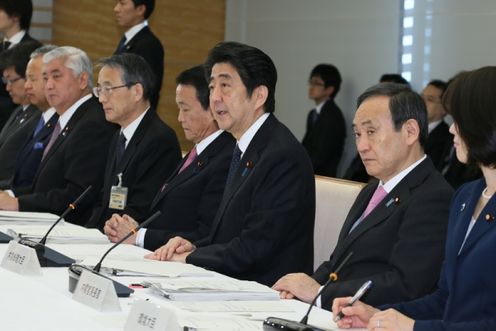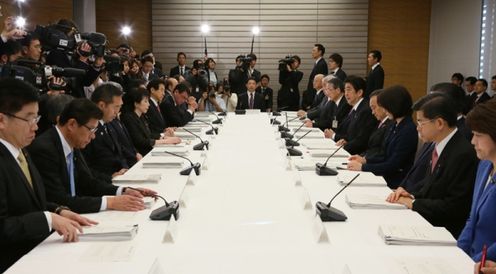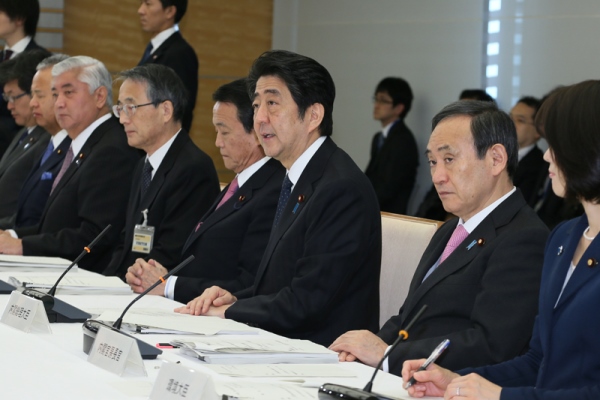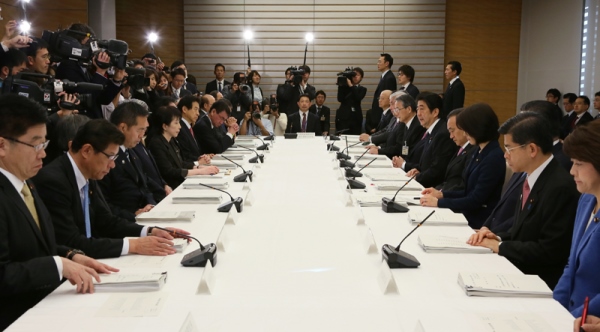Home > News > The Prime Minister in Action > December 2015 > Nuclear Emergency Preparedness Council
The Prime Minister in Action
Nuclear Emergency Preparedness Council
December 18, 2015

Photograph of the Prime Minister delivering an address (1)

Photograph of the Prime Minister delivering an address (2)
[Provisional Translation]
Prime Minister Shinzo Abe held the sixth meeting of the Nuclear Emergency Preparedness Council at the Prime Minister's Office.
At the meeting, there were reports on “the outcomes of the verification of emergency responses in the Takahama area” and the “revision of the Manual for the Nuclear Disaster Countermeasures.”
Based on the reports at the meeting, the Prime Minister said,
“Today, it was reported that a meeting of the Regional Nuclear Emergency Preparedness Council confirmed that the emergency responses for the Takahama area are concrete and reasonable.
I would like the relevant municipalities, including the three prefectures of Fukui, Kyoto, and Shiga, to collaborate closely on wide-area evacuations.
Taking the confirmed content as a starting point, the national Government will collaborate closely with relevant municipalities and businesses to verify and improve emergency responses through actual training that includes operational forces.
It has been the consistent policy of the Government to respect the decisions made by the highly independent Nuclear Regulation Authority (NRA) regarding the nuclear power stations for which the NRA conducted scientific and technical examinations and found to be in compliance with the new regulatory standards that are the most rigorous in the world, and to restart only these power stations while gaining the understanding of the host communities.
In addition, should there be a situation in which a nuclear power accident occurs and it reaches a situation which could result in a disaster, it is the Government’s important responsibility to protect the lives, health, and property of the people, and the Government will do so responsibly. The Government will spare no effort in providing maximum support to municipalities and in doing all that it can.
Four and a half years have passed since the accident at Fukushima Daiichi Nuclear Power Station of the Tokyo Electric Power Company. However, we have not been able to dispel the people’s concerns about the use of nuclear power even now. Measures for recovery, decommissioning, and contaminated water issues in Fukushima are matters of the highest priority.
I will now talk about the approach of Japan to nuclear power policies as a whole.
The Paris Agreement was reached at COP21 last week. As a resource poor country, there is simply no way for Japan to give up nuclear power if we are to secure the stable supply of energy while also making considerations for issues such as economics and climate change. Of course, our highest priority is to secure safety.
In the first place, there is a wide range of issues to be dealt with related to nuclear power; not only the restarting of stations, but also nuclear power disaster countermeasures, decommissioning, countermeasures for spent fuel, and regional development around the sites of nuclear power plants. The Government will take responsibility for these issues and work on them.
I want to request understanding and cooperation for these policies from relevant municipalities such as Fukui Prefecture. The Government will advance comprehensive policies.
We will hold explanatory meetings across the country and explain the importance of nuclear power, safety measures, and nuclear emergency countermeasures carefully in such a way that can gain the understanding of the public. In doing so, we will listen to various opinions and appropriately reflect them in Government initiatives.”


